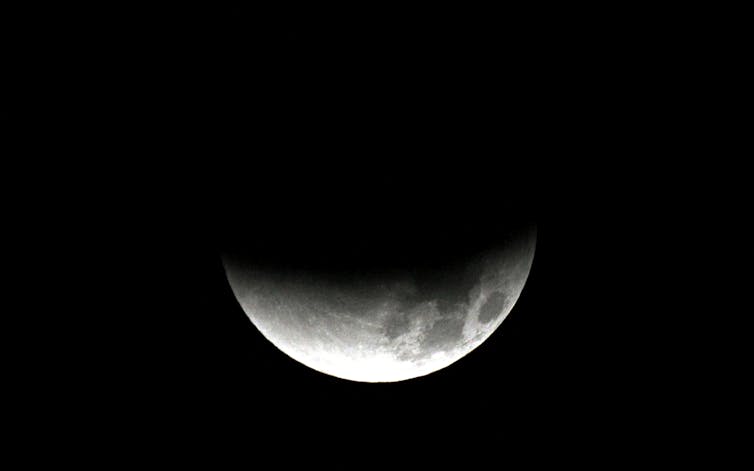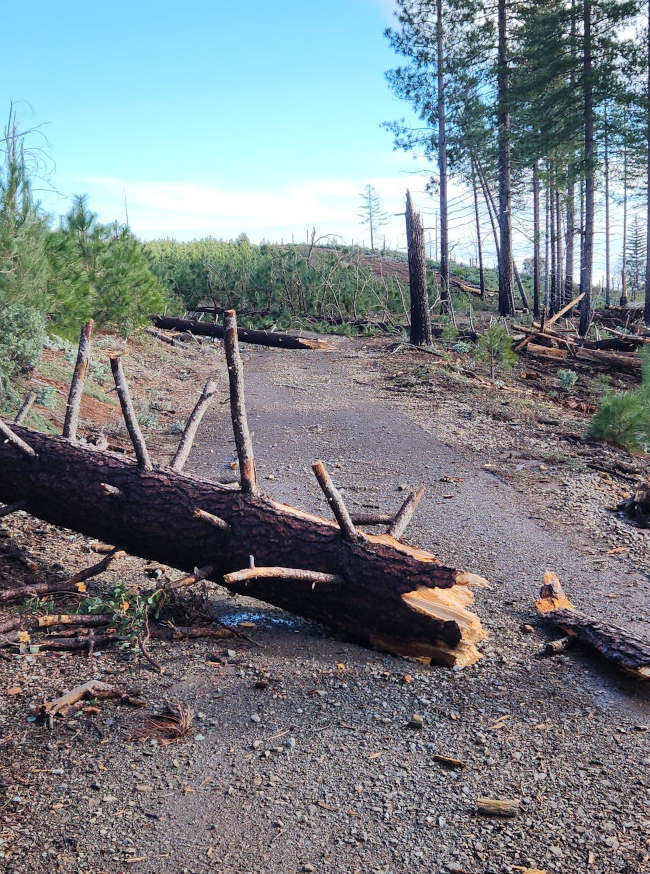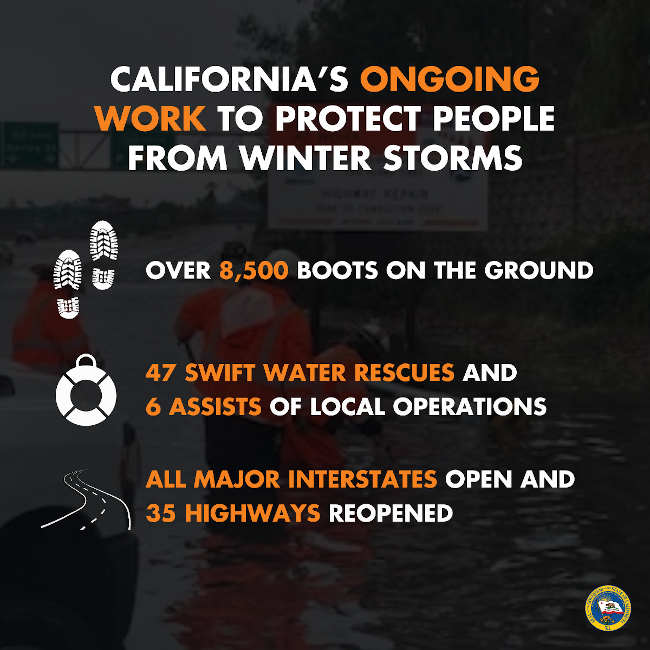LAKE COUNTY, Calif. — A certified letter from the State Water Resources Control Board that’s been arriving in the mailboxes of thousands of Lake County residents this month has caused concern and consternation, but officials with the water board and the Lake County Farm Bureau offered guidance on how to meet the requirements.
The letter, dated Jan. 31, is the result of a regulation the State Water Resources Control Board approved in December that allows it to ask for information from a large area around Lake County, said Jessica Bean, assistant deputy for drought and water rights modernization in the Water Board’s Division of Water Rights.
Bean said the Water Board’s quest for information traces back to the
Board of Supervisors’ unanimous approval, a year ago this month, of the proclamation of a local emergency as a step toward trying to save the Clear Lake hitch, a native minnow, from potential extinction. The board voted on Tuesday to continue that emergency.
The Board of Supervisors’ action was followed by a direction issued by Gov. Gavin Newsom in March that the Water Board begin to evaluate instream flows, work with tribes and other water users on voluntary actions, and consider emergency regulations to protect the hitch.
As a result, Bean said the Water Board started digging into the available information to see how water use is impacting the hitch.
She said that, often, there is a connection between groundwater and streamflow. “The problem is, we just don’t know much about that in Clear Lake, what is happening,” and the state is trying to understand how it could impact flows, she said.
The Water Board hired an environmental consultant to do a groundwater and surface water study. “We need data to do that,” Bean said.
So in September, the Water Board released draft emergency regulations, which were open for public comment for 60 days, that focused on streams and headwaters across Clear Lake’s watershed, although Bean said the study area doesn’t include the entire watershed. That led to the information regulation accepted in December.
Bean said the letter requesting information has been sent to about 1,300 property owners representing 2,300 parcels in Lake County.
The letter states, “The Order is being sent to people who own or are responsible for properties located within the Big Valley Groundwater Basin; within approximately 1,000 feet of Rodman Slough, Middle Creek, Lyons Creek, Clover Creek, Tule Lake, Blue Lakes, Scotts Creek, Adobe Creek, Kelsey Creek, Cole Creek, Manning Creek, and/or McGaugh Slough; upstream of hitch spawning habitat that may have substantial surface water diversions; and/or in areas where groundwater may be connected to key hitch spawning habitat.”
The Water Board’s information regulation went into effect on Jan. 22 and will continue through Jan. 21, 2025, unless the board readopts it, Bean said. That means that the information gathering going on now is not expected to continue beyond next year.
She said it’s a tight timeline for information gathering, and that it is unlikely that there will be additional reporting requirements from water users in the impacted areas in 2024.
Many of the people who received the order may only have domestic water usage, not usage for agriculture. In that case, Bean said, those with domestic water for home or hobby ranching can complete a simple certification by Feb. 29.
Those who are doing large commercial agricultural irrigation will be required to do more, including measuring groundwater extraction and completing reports. They must also certify that they received the order and choose a reporting pathway — either directly to the Water Board or through the Lake County Farm Bureau — by Feb. 29.
Larger water users must then submit two more reports.
The first, due by March 31, must report on water diversions, extractions and use for the month of March. The second report, due Aug. 31, will cover usage through July 31.
Detailed guidance is available in the information order letter and online at the
Water Board’s webpage set up for the hitch order.
Bean emphasized a key point: “We're not requiring people to use meters,” she said, noting that people have been very concerned about that.
There also is
guidance on how to calculate water usage without a meter on the webpage.
Bean said they have so far received a lot of calls and emails from people asking questions — especially domestic water users.
“The main people that have been reaching out to us are folks unfamiliar with the hitch issue,” said Bean.
At the same time, earlier this week the Water Board was still developing its guidelines. The weekend storm caused internet outages that resulted in tech issues for the rollout of their online guidance, Bean said.
Lake County News received reports from those who had received letters that the informational phone number was going immediately to voicemail. Bean said that’s because they don’t have a phone bank and only a small team that’s working on the process.
Bean said they are responding to people as quickly as they can, working with them one-on-one when necessary. Anyone with questions is encouraged to call or email and leave specifics about their concerns along with their parcel number.
“If people can be a little patient with us and know that we are actively working on it even if you haven’t heard back from us,” Bean said.
She said they are happy to walk people through the process. “We respect and understand the fact that it is complex” and that people would need help, Bean said.
Farm Bureau offers guidance and supportAt the Lake County Farm Bureau, which is a second reporting pathway, Executive Director Rebecca Harper said she’s been inundated with calls and emails from people who are upset about the order, which is vague in its wording.
She said she’s been contacted by many older people who don’t have computer access to fill out the information online.
“That’s been a good chunk of what I’m hearing,” said Harper.
Harper explained that it’s important for people to read the entire order. She said that there is a tendency to start freaking out when opening a certified letter from the state, and it’s key to be familiar with what is required.
Once they’ve read the entire order, she said people should seek help from the listed resources — either the Water Board or the Farm Bureau.
She emphasized that while domestic water users have exemptions, they still must complete the outlined steps, including certification.
When it comes to the reporting pathways, Harper said those who use the Lake County Farm Bureau — instead of going direction to the Water Board — are given privacy protection.
Call Harper at 707-263-0911 or email
This email address is being protected from spambots. You need JavaScript enabled to view it. to register for the Farm Bureau’s reporting pathway.
For additional help, an in-person compliance workshop will take place at 11 a.m. Friday, Feb. 16, in Room 109 at the Lake County Courthouse, 255 N. Forbes St. in Lakeport.
The text of the information order is below.
Email Elizabeth Larson at This email address is being protected from spambots. You need JavaScript enabled to view it.. Follow her on Twitter, @ERLarson, or Lake County News, @LakeCoNews.
NOTICE OF INFORMATION ORDER AND REPORTING REQUIREMENTS FOR THE CLEAR LAKE WATERSHED
This letter requires your immediate attention. You are receiving this letter because you own, occupy, or are responsible for the properties listed at the end of this letter. As such, you are required to comply with the enclosed Information Order (Order) from the State Water Resources Control Board (State Water Board or Board). The Order is being issued under the authority of the Emergency Information Order Regulations for the Clear Lake Watershed (Regulations). This letter explains why the Order is needed, when and how to comply with the Order, and where you can find more information.
Purpose of the OrderThe purpose of the Order is to gather information from water users in the Clear Lake watershed to better understand how groundwater pumping and surface water diversions affect creek flows critical for the Clear Lake hitch (hitch). The hitch population, which is a threatened species under the California Endangered Species Act, has been declining for some time and recent droughts have further impacted the population. A primary threat to hitch survival is water availability in creeks where the hitch spawn and migrate. Degraded habitat, passage barriers, predation, competition with invasive species, and pollution also can affect the health of the species.
Whv You Are Receiving the OrderThe Order is being sent to people who own or are responsible for properties located within the Big Valley Groundwater Basin; within approximately 1,000 feet of Rodman Slough, Middle Creek, Lyons Creek, Clover Creek, Tule Lake, Blue Lakes, Scotts Creek, Adobe Creek, Kelsey Creek, Cole Creek, Manning Creek, and/or McGaugh Slough; upstream of hitch spawning habitat that may have substantial surface water diversions; and/or in areas where groundwater may be connected to key hitch spawning habitat.
Where to Access Reporting Platforms and ResourcesAll information related to the Order is available on the State Water Board's Clear Lake Order webpage, which is located at
waterboards.ca.gov/clearlakehitch/order. This webpage includes links to the Board's online reporting platform, guidance documents, and more. You can also access the webpage from the Board's main Clear Lake Hitch website at
waterboards.ca.gov/clearlakehitch/order.
What You Need to DoRecipients of the Order are required to complete the following activities:
(1) Certify receipt of the Order and confirm reporting pathway by February 29, 2024.
(2) Measure and record groundwater extractions by well from
March 1, 2024 through
July 31, 2024.
(3) Submit two reports that provide information related to diversion, extraction, and/or use of water relevant to the Board's Clear Lake hitch protection efforts: Report 1 is due by March 31, 2024. Report 2 is due by August 31, 2024. The information you must provide in each report and a list of items to gather before you report are available on the Clear Lake Order webpage.
Even if you are not currently pumping groundwater or diverting surface water, you must comply with the Order. If you fail to comply with the Order, you may be fined or subject to other enforcement action. This Order does not replace any other reporting requirements. Please continue to comply with all reporting requirements you may be subject to.
How to ComplyThis section explains how to complete the required activities:
(1) How to Certify Receipt of the Order and Confirm Reporting PathwayYou must certify that you received the Order and confirm your reporting pathway through the State Water Board's online reporting platform. Reporting pathways are discussed below. The link to the Board's online reporting platform can be found on the Clear Lake Order webpage. The platform requires you enter the following access code: ClearLake.
(2) How to Measure Groundwater ExtractionsYou are required to measure and record weekly groundwater extractions by well from
March 1, 2024, through
July 31, 2024, using a method acceptable to the Board. You will provide these measurements in Report 2. For a list of acceptable measurement methods and templates for collecting measurements, please visit the Clear Lake Order Webpage.
(3) How to ReportThere are two pathways for reporting. You can either directly report to the State Water Board or you can report through the Lake County Farm Bureau Education Corporation (LCFBEC) Alternative Compliance Pathway (Pathway).
• Pathway A: Directly report to the State Water BoardThis is the default option for anyone who receives the Order. If you choose this option, you must submit your reports through the Board's online reporting platform. This is the same platform you will use to certify receipt of the Order and confirm your reporting pathway. However, the platform will open for Report 1 submissions no later than March 1, 2024, and Report 2 submissions no later than Aug. 1, 2024.
• Pathway B: Report through the LCFBEC PathwayTo report through the LCFBEC Pathway, you must register with the Lake County Farm Bureau (LCFB) by Feb. 29, 2024. Details are available on the Clear Lake Order webpage.
Once you register for the LCFBEC pathway, you will submit reports to the LCFB and the LCFB will submit report summaries and datasets to the Board. The LCFB will provide instructions on how to report after you register. You must call or email Rebecca Harper with the LCFB at (707) 263-0911 or
This email address is being protected from spambots. You need JavaScript enabled to view it. to register for the LCFBEC Pathway.
Due dates are the same no matter which reporting pathway you choose.
How to Learn More and Ask QuestionsWe understand these are new requirements and you may have questions. The following resources are available to help:
• Clear Lake Hitch Website — waterboards.ca.gov/clearlakehitchDetails on the Order, resources to help you comply, and information about other hitch activities are available on the State Water Board's Clear Lake Hitch website. You can access the Clear Lake Order webpage from this website.
• Compliance Workshop — Friday, Feb. 16, 2024, 11:00 am in LakeportAsk questions and receive details on reporting pathways, deadlines, resources, and more at the in-person workshop (255 N. Forbes St., Room 109, Lakeport, CA 95453).
• Virtual Office HoursWe will hold office hours to help you fill out reports. Dates and times will be posted on the State Water Board's Clear Lake Hitch website.
• Email Subscription ListReceive key updates from our email subscription list. Sign-up information is available on the Board's Clear Lake Hitch website.
• Email or call us at
This email address is being protected from spambots. You need JavaScript enabled to view it. or 916-341-5355.

 How to resolve AdBlock issue?
How to resolve AdBlock issue? 








